
Charles-Francois Daubigny Painting Reproductions 1 of 1
1817-1878
French Barbizon School Painter
Charles-François Daubigny was, in many ways, a painter ahead of his time. Born in Paris in 1817, into a family of artists, his early training came from his father, Edmé-François Daubigny, and his uncle, Pierre Daubigny. Initially steeped in the traditions of French academic painting, Daubigny would soon break free, finding his voice in the rugged, natural landscapes that would later define his career. His early years were spent illustrating books and producing prints, a path that both sustained him financially and sharpened his skills as an etcher - a talent that never left him, even as painting took center stage in his life.
By 1843, Daubigny found himself drawn to Barbizon, the small village that had become a hub for artists yearning to work directly from nature. Barbizon was his escape from the constraints of the studio, and it marked a shift towards plein air painting - a practice that would later inspire the Impressionists. Here, in the forest of Fontainebleau, his brush began to capture not only the picturesque beauty of the landscape but also its raw, unfiltered spirit. His strokes became freer, his palette more attuned to the subtle moods of the earth and sky.
The turning point came in 1852 when Daubigny crossed paths with Camille Corot. Their friendship was transformative, and together they explored the countryside of France, particularly along the rivers Seine and Oise. Daubigny’s boat, the "Botin", became his floating studio, and on its decks, he painted some of his most evocative river scenes, gliding through the waterways with an eye keenly attuned to the shifts in light, the play of reflections, and the quiet drama of rural life.
By the mid-1860s, Daubigny had gained considerable recognition. He became a member of the Paris Salon jury in 1866, solidifying his place in the art world. His influence on the younger generation of artists, particularly the Impressionists, cannot be overstated. His encounters with Monet and Cézanne were pivotal, as they saw in Daubigny a master of natural light and atmosphere - techniques they would push even further in their own work. Daubigny, in turn, embraced this new wave, though his later years were tinged with a sense of unfulfilled recognition.
Daubigny’s paintings, like "Springtime" (1857) and "Auvers-sur-Oise" (1868), reveal a harmony between man and nature, often using expansive horizons and reflective waters to suggest a deeper, almost spiritual connection to the land. His work paved the way for the Impressionists, and while he may not have garnered the same fame as his contemporaries, his legacy is one of quiet, enduring influence. Daubigny died in 1878, but his vision lives on, etched in the landscapes he so loved.
By 1843, Daubigny found himself drawn to Barbizon, the small village that had become a hub for artists yearning to work directly from nature. Barbizon was his escape from the constraints of the studio, and it marked a shift towards plein air painting - a practice that would later inspire the Impressionists. Here, in the forest of Fontainebleau, his brush began to capture not only the picturesque beauty of the landscape but also its raw, unfiltered spirit. His strokes became freer, his palette more attuned to the subtle moods of the earth and sky.
The turning point came in 1852 when Daubigny crossed paths with Camille Corot. Their friendship was transformative, and together they explored the countryside of France, particularly along the rivers Seine and Oise. Daubigny’s boat, the "Botin", became his floating studio, and on its decks, he painted some of his most evocative river scenes, gliding through the waterways with an eye keenly attuned to the shifts in light, the play of reflections, and the quiet drama of rural life.
By the mid-1860s, Daubigny had gained considerable recognition. He became a member of the Paris Salon jury in 1866, solidifying his place in the art world. His influence on the younger generation of artists, particularly the Impressionists, cannot be overstated. His encounters with Monet and Cézanne were pivotal, as they saw in Daubigny a master of natural light and atmosphere - techniques they would push even further in their own work. Daubigny, in turn, embraced this new wave, though his later years were tinged with a sense of unfulfilled recognition.
Daubigny’s paintings, like "Springtime" (1857) and "Auvers-sur-Oise" (1868), reveal a harmony between man and nature, often using expansive horizons and reflective waters to suggest a deeper, almost spiritual connection to the land. His work paved the way for the Impressionists, and while he may not have garnered the same fame as his contemporaries, his legacy is one of quiet, enduring influence. Daubigny died in 1878, but his vision lives on, etched in the landscapes he so loved.
9 Charles-Francois Daubigny Paintings
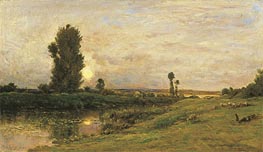
Moonrise on the Banks of the River Oise 1874
Oil Painting
$547
$547
Canvas Print
$62.11
$62.11
SKU: DCF-5677
Charles-Francois Daubigny
Original Size: 38.5 x 67.2 cm
Thyssen-Bornemisza Museum, Madrid, Spain
Charles-Francois Daubigny
Original Size: 38.5 x 67.2 cm
Thyssen-Bornemisza Museum, Madrid, Spain
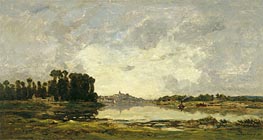
Conflans 1874
Oil Painting
$513
$513
Canvas Print
$62.11
$62.11
SKU: DCF-5678
Charles-Francois Daubigny
Original Size: 35 x 64.7 cm
Thyssen-Bornemisza Museum, Madrid, Spain
Charles-Francois Daubigny
Original Size: 35 x 64.7 cm
Thyssen-Bornemisza Museum, Madrid, Spain
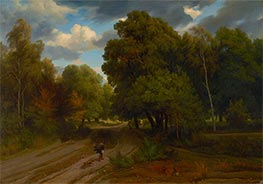
The Crossroads of the Eagle’s Nest, ... c.1843/44
Oil Painting
$1100
$1100
Canvas Print
$65.72
$65.72
SKU: DCF-17615
Charles-Francois Daubigny
Original Size: 89.5 x 116.2 cm
Minneapolis Institute of Arts, Minnesota, USA
Charles-Francois Daubigny
Original Size: 89.5 x 116.2 cm
Minneapolis Institute of Arts, Minnesota, USA
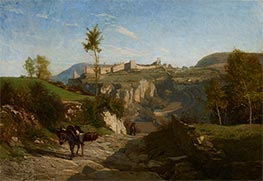
Landscape near Crémieu c.1849
Oil Painting
$974
$974
Canvas Print
$64.70
$64.70
SKU: DCF-17616
Charles-Francois Daubigny
Original Size: 62.8 x 90.8 cm
Minneapolis Institute of Arts, Minnesota, USA
Charles-Francois Daubigny
Original Size: 62.8 x 90.8 cm
Minneapolis Institute of Arts, Minnesota, USA
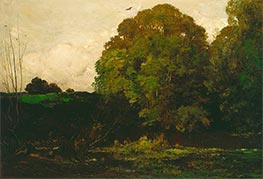
A Pond in the Morvan 1869
Oil Painting
$670
$670
Canvas Print
$63.84
$63.84
SKU: DCF-17617
Charles-Francois Daubigny
Original Size: 113 x 165 cm
Minneapolis Institute of Arts, Minnesota, USA
Charles-Francois Daubigny
Original Size: 113 x 165 cm
Minneapolis Institute of Arts, Minnesota, USA
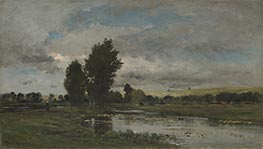
French River Scene 1871
Oil Painting
$698
$698
Canvas Print
$62.11
$62.11
SKU: DCF-17691
Charles-Francois Daubigny
Original Size: 38 x 68 cm
Kimbell Art Museum, Fort Worth, USA
Charles-Francois Daubigny
Original Size: 38 x 68 cm
Kimbell Art Museum, Fort Worth, USA
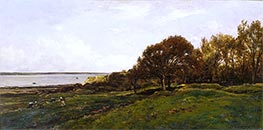
Seaside of Villerville 1870
Oil Painting
$730
$730
Canvas Print
$62.11
$62.11
SKU: DCF-19007
Charles-Francois Daubigny
Original Size: 106 x 216 cm
Fuji Art Museum, Tokyo, Japan
Charles-Francois Daubigny
Original Size: 106 x 216 cm
Fuji Art Museum, Tokyo, Japan
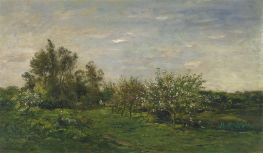
Springtime 1876
Oil Painting
$752
$752
Canvas Print
$62.11
$62.11
SKU: DCF-19746
Charles-Francois Daubigny
Original Size: 35.6 x 56 cm
Cincinnati Art Museum, Ohio, USA
Charles-Francois Daubigny
Original Size: 35.6 x 56 cm
Cincinnati Art Museum, Ohio, USA
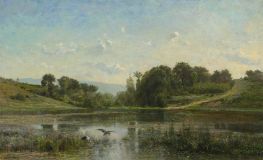
The Pond at Gylieu 1853
Oil Painting
$1291
$1291
Canvas Print
$62.11
$62.11
SKU: DCF-19747
Charles-Francois Daubigny
Original Size: 62.2 x 99.7 cm
Cincinnati Art Museum, Ohio, USA
Charles-Francois Daubigny
Original Size: 62.2 x 99.7 cm
Cincinnati Art Museum, Ohio, USA